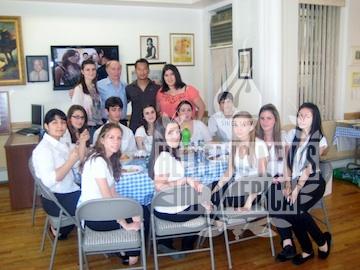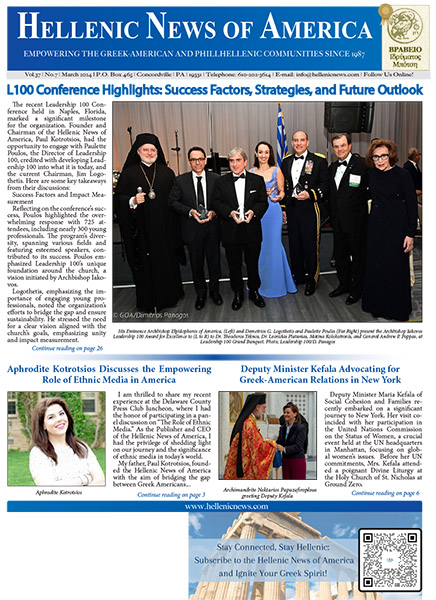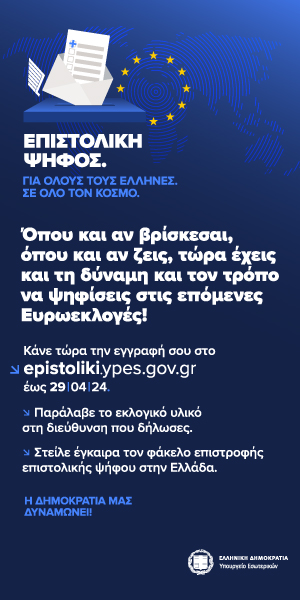
By Catherine Tsounis
Preserving culture and heritage played a prominent role at the Geros Tou Morea chapter of the Pan Arcadian Federation of America celebration on Sunday afternoon, May 20, 2012. The event took place at a closed street in front of the clubhouse at 27-02 39th Ave. in Astoria. An NYPD auxiliary police presence provided a feeling of security in an urban setting. Lambs were barbecued with excellent Greek cuisine. The St. Demetrios High School dance group performed under the direction of Demetrios Valkanas. Prominent members of the community were presented its 23rd Annual Spring Festival of the. The urban festival was held overlooking the Queensboro Bridge and attracted members from New Jersey, Chicago and Illinois who met at the clubhouse of the New York chapter at 27-02 39th Ave. in Long Island City in May. Lambs were barbecued and all enjoyed excellent Greek cuisine. The St. Demetrios of Astoria Dance Group led by Demetrios Valkanas was the highlight of the event.
“We are perpetuating our history of Arcadia in America such as our support of the National Hellenic Museum in the heart of Chicago’s Greek town and works in our institutions of Tripolis,” said Evangelos Potakis, Supreme President of the Pan-Arcadian Federation of America at the Nov. 11th, 2011 mini-convention in the Astoria chapter center. “The museum costs 20 million dollars. We donated 100,000 dollars, primarily from the Mid-Western District. We want our history of Arcadia to be heard.”
Demetrios Filios added that “a bilingual Greek/English book illustrated with photos on Arcadian history is being planned. We are expanding our scholarship program to include both high school and college students. Our purpose is to aid the Pan Arcadian Hospital.”
According to the Encyclopedia Britannica, Arcadia is a mountainous region of the central Peloponnesus…….. The region is not exactly coextensive with the present-day nomós (department) of Arkadía, which extends on the east to the Gulf of Argolís (Argolikós Kólpos). The capital of the nomós is Trípolis….. On the central plateau of the Peloponnesus, the ancient district of Arcadia was isolated from the coast, surrounded on all sides by high mountains. The plateau is also subdivided by smaller ranges. The Arcadians lived simple lives, untouched by the progress that marked the rest of Greece. The name Arcadia thus came to be a symbol of ideal simplicity, rural beauty, and contentment. It was represented as a kind of paradise in Greek and Roman poetry and Renaissance romances.”
On April 30 1981, I wrote an article entitled “Rural Migration to City Alarms Tripolis Official.” Tasos Sehiotis, the mayor of Tripolis at that time, said that in some villages only retired persons remain. As a result baptisms and weddings never take place only funerals. A genuine hero, Mr. Sehiotis was forced to spend four years of exile at a small Aegean island off the coast of Evboia during the seven years of the military dictatorship. Upon restoration of democracy in 1974, Mr. Sehiotis won back his mayorship. He aided in placing Cypriot refugees after the Turkish invasion. “No extreme of government safeguards the individual’s freedom,” he said.
Dina Kaporis Papandoniou, a database administrator, and her family go back to Arcadia every summer. “Greece is a land undergoing economic changes,” she said. “I noticed new, young families. We visit our parents Aggelis and Polita Kaporis in the village of Theoktiston, Gortynia. Villagers who were working in Athens are now unemployed. They are returning to the horio (village) to cultivate the land and pursue agricultural occupations. Employment opportunities in Athens have vanished. At least in the village, families can work in agriculture. My parents grow all their food, such as olives, feta and bread. They make their own wine. Farming is saving persons in this economic upheaval. One can live off the land.” Migration from the cities to the rural areas is the trend in 2012. A shift from urban to agrarian life is taking place.”
“Our society of “Geros tou Morea” is family oriented with children playing a central role,” explained Dina. “We have Christmas and ethnic holidays at our culture center. We have a float for our children to ride on for the 25th of March Greek Independence Day Parade. Our daughters, Theodora and Paulina, attend the Stephen and Areti Cherpelis Greek Afternoon School of St. Nicholas Greek Orthodox Church in Flushing.
Many who have visited Arcadia and Greece proper share the view that the highways and infrastructure of Greece was created primarily by the European Union, particularly Germany. The toll booths that collect revenues are in the hands of the European Union. The central government is being cut out of these funds.
George Stavropoulos, former president of “Geros tou Morea” chapter in his youth and presently in the 2000’s, is a dynamic, self-made man. Panagiota Stavropoulos, his wife, says, “George is here from 1955, when he immigrated from Kapsia, Arcadia. His father died when he was four years old. I am from the same village. My father was a farmer. We have four children and 10 grandchildren. We have our tickets and plan to go to Greece this summer.”Kapsia is a village in the mountains. that has much to offer in summer or winter. The winters attract tourists and Greek/European celebrities coming to ski the slopes of the nearby mountains.
A group from the Whitestone Holy cross church attended. They included Vicki Palma, a famous singer, Maria Carvelas, educator Stavros and Ellie Zhouga of the Epirotan Federation, Elpitha and John Stavropoulos and many others. They all agreed the music, food and atmosphere was hospitable.
Demetri Valkanas grew up down the street from the culture center. “My Father wanted us to be close to persons from his village,” he said. “My father, George, just passed away suddenly. He taught me to love Greece and be fluent in the language. My grandfather, Demetri, and his three brothers fought in WWII on the Albanian front. My grandfather only survived. My grandfather’s three great uncles, Andreas, Panagiotis and George, were German prisoners of war. They were executed in Tripolis. My father was a member of ‘Geros tou Morea’ when he immigrated about 1957. There was a strong youth group when I was growing up. He was a secretary and vice-president of the organization. I have been dancing Greek folk dances from a young child. I am a Science teacher at St. Demetrios day School in Astoria.”
The late George Valkanas passed away on the 12th of February. He was a prominent businessman, who immigrated from the village of Chrani, near megalopolis, Arcadia. Sotiria Valkanas, his wife, is from main land china. She became Hellenized young who is of Asian background, is fluent in Greek and an outstanding Phil-Hellene. Demetri spent his summers in Arcadia, becoming the finest example of a Greek-American youth. George Valkanas unique family is continuing Hellenism and donating their time to “Geros tou Morea”.
The Pan Arcadian Federation is distributing across the United States Professor Maria Karydi’s book “ARCADIANS: Origins, Character, their Diaspora in Ancient Times and their Contribution to Civilization”. Professor Karydi proves that “the arrival of the Greeks in the form of a mass influx of migrants, which was conveniently dated initially to 2100 B…may in fact never have taken place. According to the evidence of Linear B, all the Greek dialects of historical times were the result of the differentiation from Southern Greek (Arcadian-Cypriot) and Northern Greek (Doric). Ionic and Aeolian made their appearance after 1200 B.C.
In the ancient historians, the term Arcadia refers not to a geographical unit, but to a specific ethnic group that formed a branch of the Greek nation. In Greek mythology, especially in the myths relating to the birth of the gods, arcadia is represented as the birthplace of many deities. The activities of mythical heroes such as Hercules, Atlas and even Prometheus are located with its borders.
Despite the theories that have been advanced on the origins of the Arcadians, on the conscience of the ancient Greek world, they were autochthonous and older than the moon. That is they settled in their land before there was a moon. According to the ancient Greek literary sources (Herodotus, Strabo, Dionysius of Alikarnassos and Pausanias), the Arcadian colonization spread over a wide radius in the Mediterranean…The populous tribe of Arcadians, especially vital and warlike, could not be confined to its barren homeland, but was obliged constantly to seek a better life in other territories or to make its armies available or strengthen the military forces of ancient times with mercenaries.”
The 2012 members of the Geros Tou Morea chapter include the following persons: Demetrios A. Filios, President; Apostolos Lagos, 1st Vice President; Nick Georgiou, 2nd vice President; John Siolas, Secretary; Chris N. Vournas, Treasurer; Board Members, Nick Economou, Chairman, Gloria Catsimalis, Anastasios Reveliotis, George Stavropoulos, Angeliki Vourna: Alternates Alexandros Gianoulis, Steve Hasoulas, Anastasios Prountzos; Board of Trustees Maria Georgiou, Chairman, Theodore Bouzalas, Co-Chairman, Kostas Kassimis, Co-Chairman, Vaasiliki Gianikas, James Fotopoulos, Chris Koukoulas, Panagiotis Soursos; Legal Advisor, George Spelios, Esq.; Auditing Committee Eleni Catsimalis, Chairperson, Metaxia Mantzakou, Pitsa Pasias; Founders Tom Angelopoulos, Mike Bakopoulos and Alexander Sioris. A picnic is planned for June 25th at the Mattituck Veterans Park Beach.
Photo: The St. Demetrios of Astoria Dance Group led by Demetrios Valkanas was the highlight of the event.







